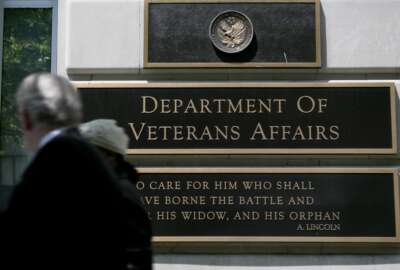
VA HR officials support bill to overhaul agency’s 16-year old pay model for doctors
Top human resources officials for the Department of Veterans Affairs say a bipartisan bill raising pay caps for VA doctors and other health care providers would...
Top human resources officials at the Department of Veterans Affairs say a bipartisan bill lifting pay caps for VA doctors and other health care providers would help keep the agency staffed up to handle its workload.
The VA CAREERS Act, introduced in January by Senate VA Committee Chairman Jon Tester (D-Mont.) and Sen. John Boozman (R-Ark.) would set higher base pay caps for VA physicians, podiatrists, optometrists and dentists.
Base pay for physicians, dentists and podiatrists in several specialties is currently capped at $400,000 — the current annual salary of the president.
Jessica Bonjorni, the head of human capital management at the Veterans Health Administration, said the current pay caps are a constraint for the VA, especially for high-cost-of-living areas and for specialties such as cardiology, neurology and radiology.
“There are physicians coming right out of school who are making well over what we’re able to offer right now to our very tenured providers. So our ability to compete in the market is significantly hampered by the caps,” Bonjorni told the committee Wednesday.
VA’s Chief Human Capital Officer Tracey Therit said the latest version of the VA CAREERS Act would restructure the pay model for VA doctors and other medical professionals that’s been in place for 16 years.
Therit said the bill would eliminate the performance and longevity components of the current pay system for VA physicians, podiatrists and dentists. She said this restructuring would change the pay structure and caps for this part of VA’s health care workforce, but would not reduce pay.
The bill would also add VA optometrists to this pay system.
Therit said VA supports this version of the legislation, as it would “allow VHA to be more competitive with local labor markets, meet the increased demand for critical clinical specialties and more efficiently and effectively compensate providers.”
Under the current pay system, Therit said the VA risks “losing high-quality providers in complex clinical specialties to the private sector, impacting VHA’s ability to deliver quality care to veterans.”
The bill also creates a separate compensation system under Title 38 for VA medical center directors and Veterans Integrated Services Network (VISN) directors.
The rates of pay for employees in these positions would be set and periodically adjusted by the VA secretary. These positions would remain eligible for performance awards.
“VHA continues to face significant challenges addressing the rapidly evolving and changing healthcare industry. To be part of this transformation, VHA must have medical center and network directors with the skill set to provide enterprise-wide solutions to their clients, our nation’s veterans,” Therit said.
Bonjorni said the VA CAREERS Act would allow VHA to set pay more in line with how private-sector health care providers do, and would still offer performance pay under the new model.
“It will allow us to include different components in setting the pay and it gives us the flexibility to make adjustments at a higher level,” she said.
Bonjorni said VHA is still having a hard time recruiting lower-wage health care workers, including nursing assistants and licensed practical nurses (LPNs).
“That’s an area where we’re continuing to see high attrition and fewer people wanting to go into those careers,” she said. “They’re stressful jobs that are important, but they probably are not earning enough money.”
Therit said the VA is implementing nearly all of the recruitment and retention incentives received in the PACT Act. She said the VA is still finalizing a policy that would allow the VA to buy out the contracts of private-sector health workers it plans to hire.
The legislation gave the VA up to $40 million a year to buy out the contracts of certain private-sector health care professionals in exchange for employment at rural VA facilities.
The VA is also finalizing pay waiver authority under the PACT ACT with the Office of Personnel Management.
Reducing VA’s time to hire
The VA and lawmakers are also looking to drive down the agency’s lengthy time to hire.
Committee Ranking Member Jerry Moran (R-Kan.) said the VA has presented plans to revamp its hiring and onboarding process, to shorten the time it takes for new providers to begin patient care and to do so in a way that is as “painless as possible for the new employees.”
“It is no secret the VA’s lengthy hiring process is one of those reasons that we lose qualified candidates,” Tester said.
Therit said the VA is also using direct hire authority to bring new hires onto the job in about 40-60 days, compared to its average time-to-hire of 100 days.
Bonjorni said the VA’s average time to hire is about 100 days, but that period starts at the time the agency approves recruiting to fill a vacancy and ends when it hires someone.
VA’s “time to fill,” which starts at the time a vacancy occurs, and ends when the position is filled, is about 230 days.
“We have different targets and different averages for different types of jobs and there’s variability across the system. Some locations are hiring faster than others,” Bonjorni said.
Early in the COVID-19 pandemic, the Office of Personnel Management granted the VA emergency authority to onboard health care providers in as little as two weeks.
Sen. Thom Tillis (R-N.C.) said Congress should consider reinstating these expired authorities.
“I think we should go back and say, ‘If it’s working, why did we stop it?’ I understand why, but Congress can fix that,” Tillis said. “You got a chance to use it, you got a chance to stress test it. If it proves to be efficacious, then you all should be coming back to us and saying that these temporary authorities need to be reinstated.”
Copyright © 2025 Federal News Network. All rights reserved. This website is not intended for users located within the European Economic Area.
Jory Heckman is a reporter at Federal News Network covering U.S. Postal Service, IRS, big data and technology issues.
Follow @jheckmanWFED
Related Stories

IG tells Veterans Health Administration to strengthen background checks to avoid hiring persons barred from employment




